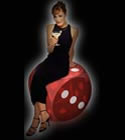Failing to announce your entire poker hand not only will slow down the game, but also can be very irritating.
For instance, it is not uncommon for the bettor to announce, “I have a seven for low,” then the caller to say, “I have two pair for high,” and then the bettor to state, “I also have trips for high.”
I recognize that it is not the dealer’s job to tell players that they should call their complete hands.
But there is no reason why some players cannot politely encourage other players to do this.
By the way, you are not expected to be only player at the table who is polite.
If no one else will call his complete hand, then you might as well call only one side of your hand.
Also, when the hand is over, make sure that you call your hand rather than just turn it face up.
Otherwise the dealer will have to sift through your cards to determine what you’ve made.
This encourages dealer errors, plus the dealer has to take his attention away from the pot and the other online pokerplayers’ hands.
In gambling, anything can happen. By not calling your hand, you are increasing the chances that things can go wrong – not so much by cheating, but by mistakes that can be made.
In addition, it is helpful to arrange your cards so they are visually easy to read.
This way, the dealer won’t have to touch your hand. If you do nothing but turn your cards face up, it is always possible that the dealer will overlook your hand, pick it up, and then muck it.
If this happens, you have no one to blame but yourself when your opponent stacks all the chips.
seven card stud eight-or-better, like high-only stud, is an ante game. That is, the antes should be in front of every player and then raked into the center of the table before the dealer deals.
The first card should not come off the deck until all the antes are in the pot and together.
A dealer should never deal the hand and then say to someone, “You’re light.” The custom is for the dealer to request players to ante, and if a player fails to act, he should be dealt out.
There is no reason for the dealer to ask two or three times for a player to ante unless it is likely that the player did not hear the dealer’s request.
In stud eight-or-better, some players who lose two or three hands in a row like to sit out a hand.
Usually they are trying to change their luck or to change the run of the cards, which by the way is complete nonsense.
However, when a dealer keeps asking one of these players to ante, it not only will irritate that player, but will slow down the game as well.
The dealer should ask once, and then deal if the player doesn’t respond. A dealer should never reach into your stack and take off an ante to put you in.
In fact, a dealer should not touch your chips at any time, nor should a player ever touch another player’s chips.
However, this is often done in the bigger games, because most high-limit players trust each other.
Through the years, there has not been much of a problem with this practice.
Introduction / Playing in Tight Games / Playing in Loose Games / Playing Short-handed / Big Games Versus Small Games / Running the Game / Afterthought


